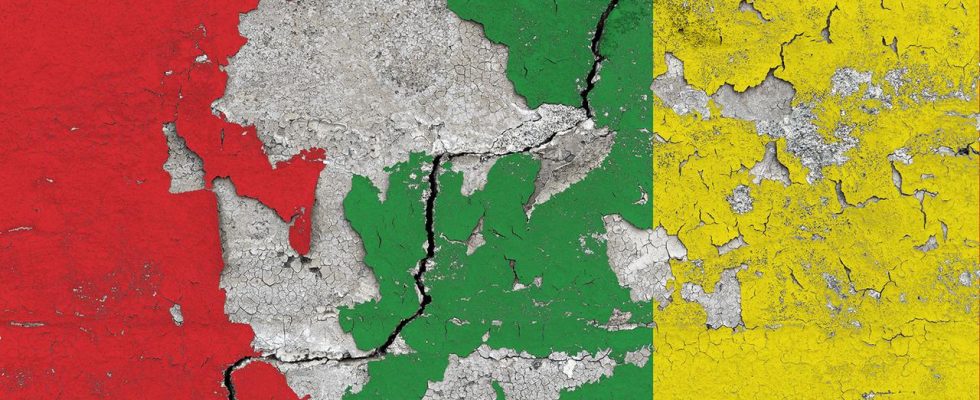analysis
There is no tailwind from Berlin for the traffic light parties campaigning at the state level. Is the frustration with federal politics also reflected in the election results in Bavaria and Hesse?
If Olaf Scholz tends to have night prayers, he will probably include the FDP in this at the moment: May they be re-elected to the two state parliaments in Hesse and Bavaria. It is entirely possible that his smallest coalition partner in the federal government could fall below the five percent threshold in the two federal states on Sunday.
Then things could become much more uncomfortable for him as Chancellor of the three-party coalition made up of the SPD, the Greens and the FDP. “Traffic lights are not good for the FDP” would probably be the reading in some FDP circles: the group of traffic light opponents and skeptics in the liberal party would get a boost, and the traffic light internal riot factor would certainly increase.
A lot depends on the FDP values
However, the federal coalition can no longer afford to tear itself apart. Dissatisfaction levels with the traffic light coalition, which is heading towards its halfway point, are too clear and too high. If Scholz wants to achieve his goal of ruling in this alliance for longer than one legislature, he will have to change a lot after election Sunday. Because his party will probably give up there too – Hesse and Bavaria will then surely point out a lack of tailwind from Berlin from the SPD headquarters.
The upcoming state elections in Hesse and Bavaria will result in a vote on traffic light policy. “Also because there are no particularly contentious issues in the federal states,” says political scientist Uwe Jun in an interview tagesschau.de.
Is federal policy damaging in the states?
In Hesse, this negative effect of federal political influence is probably doubled: Nancy Faeser, Scholz’s Federal Minister of the Interior, is running as the SPD’s top candidate. She is perceived there more as a federal rather than a state politician, even though she was already the opposition leader in Hesse.
Not only because she made it clear that if she were defeated in the election, she would not move to Hesse, but would keep her position in the federal government. Also because, as Interior Minister, she stands for an issue that concerns many people in the country: migration policy.
The topics of immigration and flight are currently being discussed GermanyTrend identified as an important problem that politicians must address as a matter of urgency. You can feel this in the election campaigns in the states, but also in the traffic light party headquarters in Berlin – the issue has also reached the Greens.
It was the hope of the state SPD to be able to benefit from Faeser’s prominence as a federal politician. The calculation probably won’t add up if you look at the pre-election polls. There the SPD is at 16 percent, the same value as the federal SPD. In the state elections in 2013, the SPD was able to achieve 30.7 percent, in 2018 it was 19.8 percent of the vote.
A reminder for “those in Berlin”?
Already in 2018, half of the voters in Hesse said in an election survey that the state elections in Hesse were a good opportunity to give the federal government a lesson. At that time, the grand coalition of CDU/CSU and SPD under Chancellor Angela Merkel was still in power – in an already exhausted third edition of this alliance, into which the SPD had entered with little conviction.
The CDU and CSU also presented a divisive picture with the protagonists Merkel and Horst Seehofer (CSU), especially when it came to migration policy. Even back then, voters criticized the federal government’s “disunity”, similar to today.
It is therefore not enough to just identify the current federal government, with its often divisive demeanor, as the cause of possible reminders in the double election. In parts of the electorate, the distance to “those up there” is growing, and the AfD and Free Voters are benefiting from this.
“The AfD acts as a lesson par excellence,” says political scientist Jun, to signal to voters: “I’ll show them in Berlin.” This means that the partly right-wing extremist party, which creates sentiment against migrants, the media and the government, is currently able to make full use of its voter potential, both at the federal level and in the states. She will “probably be the winner this Sunday,” predicts Jun.
Weak point in the heating law
The Building Energy Act in particular has contributed to the fact that this impression of the government’s aloofness has increased among some citizens, says Jun. The so-called Heating Act, of which a first draft was leaked in an early voting phase, is viewed in retrospect by his Doers themselves see this as a major weak point in the traffic light policy.
“What we underestimated was that we left the social flank open for too long,” admitted Green Party politician Michael Kellner in the ARD recently one. That was the “low point in the traffic light legislative process,” said the State Secretary in Robert Habeck’s Ministry of Economics and Climate Protection, which is responsible for this. They could and should have done it better – the traffic light coalition has this self-critical insight.
The question of whether and how one can afford climate policy concerns the lower classes. The sociologist Steffen Mau, who was invited by the Chancellery as a guest speaker at the recent cabinet meeting in Meseberg, has some advice for politicians: “If you want to get people excited about change, you have to give them the feeling that they don’t just tolerate or suffer the changes, but to help shape it,” he told “Spiegel”. Only then will they be ready to rethink their habits and possessions.

